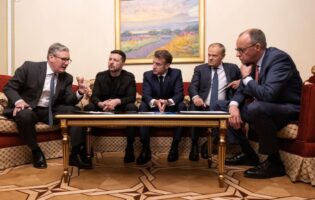Youth Exchange and the ‘Special Relationship’ between Germany and Israel
On May 26th, 2016, AGI hosted a seminar regarding youth exchange programs between Germany and Israel and the political implications these programs have for the participants and their home countries. The seminar opened with a presentation about the youth exchange programs, with an emphasis on the research of Dr. Simone Heil which she conducted at the Jacobs University Bremen. Currently she serves as the program director of the Africa and Middle East division of the Alexander von Humboldt Foundation.
Within the realm of foreign cultural policy, youth exchange programs between Germany and Israel have been essential to bettering the relationship between the nations since the 1960s. Dr. Heil’s research was conducted to enhance the knowledge, perception, and relationship between Germany and Israel as a result of these exchange programs. The research specifically focused on the results of the interviews with participants in the exchange programs, their accompanying teachers, politicians, experts at the municipality level, staff members of organizations involved in German-Israeli youth exchanges, and researchers. One of the major findings was that the youth exchange programs improved the perception of the participants’ respective countries, and that different generations of participants contributed to German-Israeli relations in different ways.
These newly changed views and perceptions were vastly different from the images that Israelis and Germans had of Israel and Germany prior to the exchange programs. When the programs began in the 1960s, the view of Germany in Israel was naturally shaped by the Holocaust, whereas the view of Israel was shaped by Germans as a developing country, the holy land filled with historical sights and plagued by the Middle East conflict. After the programs, participants saw both countries as modern, full of friendly people. Israelis saw a new Germany, not the Germany of the Holocaust, and Germans took away a deeper understanding of the conflicts in the Middle East and daily life in Israel. Many Israelis found a deep understanding of their identity as an Israeli both culturally and politically when in Germany, and the same was true for the Germans. At the completion of the exchange programs, different generations of participants contributed to bilateral relations in different ways. Youths who participated in the 1960s were more likely to contribute to relations in the public sphere, for example, joining activist groups related to German-Israeli relations or anti-discrimination. However, participants in the later years, such as in the 1990s, are less publicly active and see their contributions in the private sphere, for example, dispelling stereotypes or misconceptions among family and friends and maintaining friendships with other participants.
Participants of the youth exchange programs have had an increasing interest in discussing Middle Eastern politics, particularly the Arab-Israeli conflict and the role Germany can play as a mediator. A notion existed that with Germany’s status as a non-Middle Eastern country, it has the capacity and potential to not only pass information, but also to negotiate and mediate the conflicts faced in the region. However, the results showed that there is much controversy and criticism towards Germany’s role as a mediator, especially from the organizers of the youth exchange programs, brewing the debate regarding third party involvement in the affairs of others, not to mention such a heavy responsibility put on the shoulders of teenagers without formal education and training in international relations and conflict resolution.
The role of the young participants in conflict resolution is not the only criticism of the bilateral exchange. The exchange programs can be elitist, as students need good knowledge of English and countries want the absolute best and brightest to be their bridge builders, but there is an effort in recent years to make the programs more inclusive and diverse. The programs also need to expand the topics. The Holocaust remains an important topic during the exchange, but students are now interested in many other issues, such as the Middle East conflict and integrating foreigners. Nevertheless, the youth exchange programs have contributed to improving the bilateral relationship between Germany and Israel.
Dr. Simone Heil studied the Politics and History of the Middle East at the University of Durham in the UK and the Hebrew University of Jerusalem in Israel. She completed her PhD, with distinction, on German-Israeli youth exchange at the Jacobs University Bremen in 2011. Thereafter, she held positions at the Bremen International Graduate School of Social Sciences, the Jacobs University Bremen, and the Friedrich-Ebert-Foundation. Since 2014 she has served as the program director of the Africa and Middle East division of the Alexander von Humboldt Foundation in Bonn.
Location
AICGS R. G. Livingston Conference Room
1755 Massachusetts Avenue NW Suite 700 Washington, DC 20036 United States






